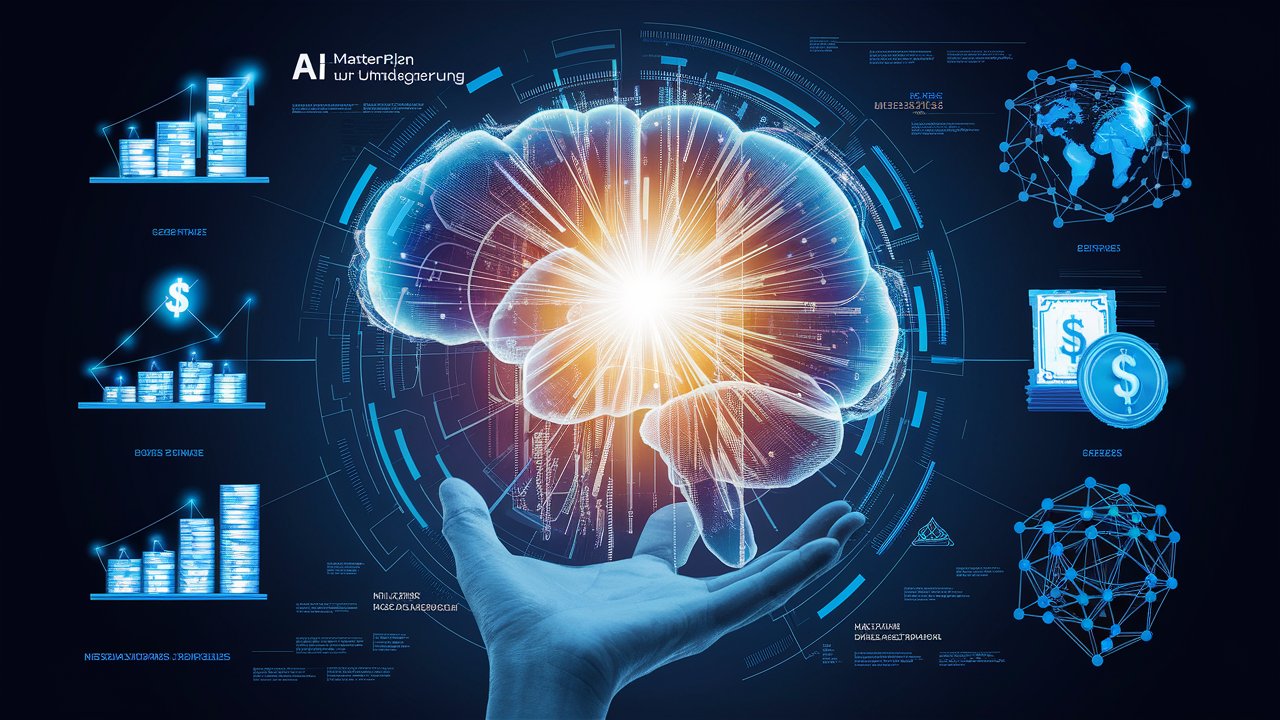You, as an AI enthusiast and top affiliate marketer, are on the cutting edge of leveraging Artificial Intelligence to transform product marketing with the KI-MASTERPLAN. The crucial role of AI in marketing is evident in its ability to provide valuable insights into customer behavior, enabling personalized campaigns tailored to specific needs. By integrating Machine Learning algorithms, businesses can conduct precise customer segmentation and predict future needs, leading to enhanced customer experiences and long-lasting relationships. AI not only enhances marketing efficiency but also ensures relevance by delivering messages at the right time and place for maximum impact.
Key Takeaways:
- AI in Marketing: AI plays a crucial role in marketing by providing insights into customer behavior, enabling personalized marketing campaigns tailored to individual preferences.
- Transformation in Marketing: Integrating AI into marketing can revolutionize how businesses interact with customers, allowing for precise customer segmentation and proactive response to customer needs.
- Implementation Considerations: Careful selection of AI tools, ethical use of data, and continuous monitoring and optimization are vital for successful AI-driven marketing strategies.
- Strategic Planning: Strategic planning of AI-based marketing campaigns involves analyzing target audiences, personalizing and automating marketing efforts, and integrating AI into existing marketing channels.
- Measurement and Optimization: Success metrics (KPIs), continual improvement, and machine learning are key for evaluating AI-based marketing strategies, measuring success, and adapting to changing market conditions.
The Importance of AI in Modern Marketing
The Role of AI in Data Analysis
For a profound transformation in modern marketing, AI plays a crucial role in analyzing vast amounts of data to provide valuable insights into customer behavior. With AI algorithms, businesses can create personalized marketing campaigns tailored to the specific needs and preferences of their customers. This not only increases marketing efficiency but also enhances relevance.
Personalization and Customer Experience
Experience Personalization and customer experience are paramount in modern marketing strategies. AI-driven personalization can help businesses anticipate customer needs and behaviors, proactively engage with customers, and build long-lasting relationships. For instance, by utilizing AI for targeted advertising and tailored marketing actions, companies can enhance customer engagement and increase sales opportunities.
Understanding AI Technologies
Definition and Types of AI Technologies
Some of the key AI technologies include machine learning, speech recognition, image recognition, and natural language processing. Understanding these technologies is crucial for implementing AI in marketing strategies effectively. Knowing the differences and capabilities of each technology can help businesses tailor their approach for maximum impact.
| On | Definition of AI Technologies |
| On | Types of AI Technologies |
| On | Use Cases in Marketing |
| On | Implementation Challenges |
| On | Future Developments |
Machine Learning and Its Applications
The evolution of AI has paved the way for machine learning to thrive in various industries. The ability of machine learning algorithms to analyze vast amounts of data and generate predictive insights is revolutionizing marketing strategies. The integration of machine learning in marketing campaigns allows businesses to create targeted and personalized campaigns, enhancing customer engagement and improving conversion rates.
The utilization of machine learning algorithms enables businesses to gain a deeper understanding of customer behavior and preferences. Another benefit is the ability to optimize marketing strategies continually based on real-time data analysis. With machine learning, businesses can adapt their products and services to meet the evolving needs of their customers, providing a personalized and enhanced user experience.

AI in Product Marketing
After discussing the significance of AI in modern marketing, let’s investigate into how AI is revolutionizing product marketing strategies. AI brings a plethora of benefits, from personalized product recommendations to intelligent pricing and inventory management, automated customer communication, and feedback analysis.
Personalized Product Recommendations
Product recommendations leveraging AI algorithms enable businesses to offer personalized suggestions to customers based on their preferences and past behavior. This enhances customer experience, increases engagement, and boosts the likelihood of conversions.
Intelligent Pricing and Inventory Management
Management of pricing and inventory through AI-driven tools enables businesses to optimize pricing strategies, manage stock levels efficiently, and predict demand accurately. This leads to improved profitability, reduced wastage, and enhanced customer satisfaction.
Plus: By utilizing AI for pricing and inventory management, businesses can dynamically adjust prices based on market demand, competitor pricing, and customer behavior. This allows for agile decision-making and maximizes revenue potential.
Automated Customer Communication and Feedback Analysis
Product:
Automated customer communication tools powered by AI streamline interactions, deliver timely responses, and personalize engagement with customers. Feedback analysis tools help businesses understand customer sentiments, improve service quality, and drive continuous enhancements in products and services.
Personalized: AI helps in tailoring communication based on customer preferences, language, and demographics, enhancing overall customer satisfaction and loyalty.

Strategic Planning of AI-Driven Marketing Campaigns
Target Audience Analysis with AI
All modern businesses understand the importance of accurately identifying and predicting customer behavior. With AI technologies, this becomes not just a possibility, but a powerful tool in personalized marketing campaigns. By analyzing vast amounts of data, AI can offer insights into customer preferences, allowing businesses to tailor their marketing strategies to specific demographics effectively.
Personalization and Automation of Marketing Measures
Automation is a key factor in optimizing marketing efforts. By utilizing AI-driven personalization and automation, businesses can enhance customer engagement and increase conversion rates. Tailored content and automated processes not only strengthen customer loyalty but also save time and resources, leading to more efficient marketing operations.
Predictive Analytics and Performance Optimization
Driven by AI, predictive analytics go beyond traditional methods, offering businesses the ability to foresee customer needs and behavior. This proactive approach enables companies to adapt their marketing strategies in real-time, ensuring maximum impact. Continuous monitoring and adjustment of predictive models are crucial for success in optimizing marketing performance.
Implementation and Tools
Selecting the Right AI Tools for Your Business
Not all AI tools are created equal. Any business looking to leverage the power of AI in their product marketing needs to carefully select the right tools that align with their specific requirements and goals. The chosen tools should be capable of analyzing, predicting, and personalizing effectively, while seamlessly integrating into existing systems and processes. Scalability, data security, and compliance with regulations should also be key considerations in the selection process.
Integration of AI into Existing Marketing Channels
Tools for integrating AI into existing marketing channels play a crucial role in automating, personalizing, and optimizing marketing activities. The integration of AI tools can enhance the efficiency and effectiveness of marketing campaigns, creating relevant and engaging content for target audiences. A successful integration of AI requires a thorough analysis of marketing channels to identify where AI can provide the most value. Continuous monitoring and adjustment of AI models are important to ensure desired outcomes and improve customer experiences.
Continuous Improvement and Machine Learning
Existing marketing strategies can benefit greatly from continuous improvement and machine learning. With the implementation of feedback loops and the use of AI technologies, companies can automatically recognize patterns and trends in data, adjusting their marketing strategies accordingly. Machine learning allows companies to optimize marketing strategies based on real-time data and customer behavior, providing a personalized user experience. It is crucial for companies to ensure ethical and responsible use of AI systems for continuous improvement and machine learning to gain customer trust and build long-term relationships.

Measuring Success and Optimization
Key Performance Indicators (KPIs) for AI-Based Marketing Strategies
Despite the significant advancements in AI-based marketing strategies, measuring success remains crucial. Key Performance Indicators (KPIs) specific to AI, such as ROI, conversion rates, and customer satisfaction, are important for assessing the effectiveness of these strategies. By continuously analyzing and monitoring these metrics, companies can optimize their marketing strategies utilizing AI.
Continuous Monitoring and Improvement of AI Models
Success in AI-based marketing strategies hinges on continuous monitoring and improvement of AI models. It’s important to ensure that the AI systems adapt to changing market conditions and customer behaviors. By implementing feedback loops and leveraging AI technologies, companies can automatically recognize patterns and trends in data, refining their marketing strategies for optimal results.
It is crucial that companies pay attention to data protection and privacy when utilizing AI-based technologies. Adhering to ethical standards and legal regulations is paramount to gain customer trust and build long-lasting relationships.
Ensuring Ethical and Responsible Use of AI
AIBased technologies offer tremendous benefits, but companies must ensure ethical and responsible use to avoid negative consequences. Transparency in data usage, ethical AI algorithms, and compliance with data protection laws are important. The ethical and responsible use of AI technologies not only builds customer trust but also minimizes risks and paves the way for a sustainable future.
Final Words
Now, as we examine into Artificial Intelligence in product marketing, it’s clear that AI is transforming the way businesses interact with customers and optimize their marketing strategies. The KI-DERKI MASTERPLAN showcases the power of AI in personalizing marketing campaigns, predicting customer behavior, and enhancing the overall customer experience. While the future holds exciting possibilities with AI integration in marketing, it’s crucial for companies to proceed with careful planning and monitoring to mitigate any potential risks to data privacy and security. Ultimately, AI stands poised to revolutionize product marketing, offering a wealth of opportunities for businesses to thrive in the digital landscape.
FAQ
Q: How is AI transforming product marketing?
A: AI plays a crucial role in product marketing by analyzing large amounts of data to provide valuable insights into customer behavior. This allows companies to create personalized marketing campaigns tailored to the needs and preferences of their customers.
Q: What are some practical applications of AI in product marketing?
A: Some applications of AI in product marketing include personalized product recommendations, intelligent pricing strategies, automated customer communication, and analysis of customer feedback to optimize marketing strategies.
Q: How can AI improve customer experience in marketing?
A: AI can enhance customer experience by predicting customer behavior, enabling targeted marketing campaigns, and providing personalized interactions. This strengthens customer engagement and fosters long-term relationships.
Q: What are the key considerations when integrating AI into marketing strategies?
A: When integrating AI into marketing strategies, it is vital to choose the right AI tools that align with the specific requirements and goals of the company. These tools should be capable of analyzing, predicting, and personalizing content efficiently while ensuring data security and compliance with regulations.
Q: How can companies measure the success of AI-based marketing strategies?
A: Companies can measure the success of AI-based marketing strategies by defining key performance indicators (KPIs) such as return on investment, conversion rates, revenue growth, customer satisfaction, and brand awareness. Continuous analysis and monitoring of these KPIs allow companies to optimize their marketing strategies effectively.
